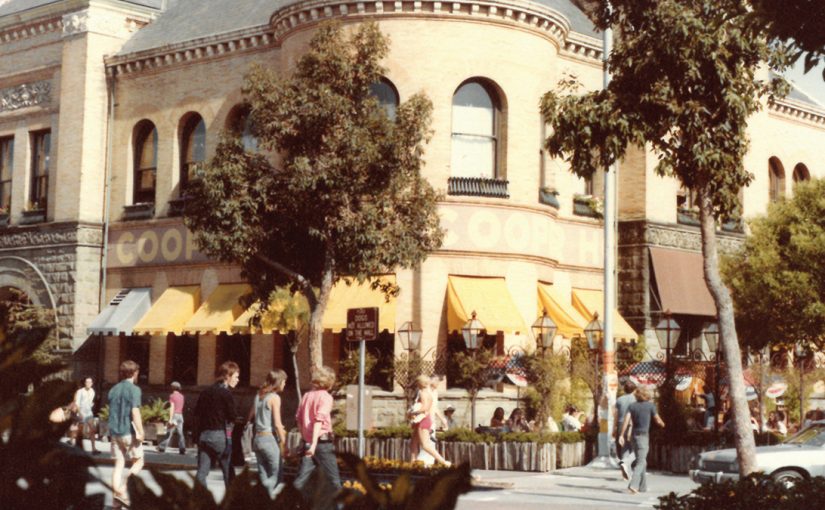A bright and sunny day. I went out as often as I could to test how difficult the stairs here in my trial apartment would be. What I’ve concluded is, if I never have to drink more than tap water or eat more than takeout, the stairs should not be a problem.
What I wonder about is all the old ladies in town with their shopping carts. They don’t all live on ground floors or in elevator buildings. Yet you see them loading up, and presumably carrying their shopping up to kitchens high above ground. Do not be intimidated by old women, especially old Italian women, they are a superior race and their methods are not to be questioned, nor will they ever be understood by those of us outside the fold. And they have a lifetime of practice.
Wait! So have I. For fifteen years I shared a fifth floor walkup and carried groceries every day at least once. My only experience with an elevator building was four years in Brooklyn. But hauling up a shopping bag with liquid purchases yesterday, and again today, felt borderline unsafe.
My personal history regards places to live has been pretty fortunate. When confronted with a conundrum about whether to change a residence, it has usually (maybe even always) meant hunker down and wait. I’ve lived in everything from a fifth floor walkup (before the one referenced above) two rooms and a kitchen with shower, to a ten-room spread with covered porch and balcony. And every place I’ve lived, basic or luxurious, has been perfect for its time. Then suddenly something would change (or was scheduled to change) and it was necessary to look elsewhere. That change has come, and the looking has begun. The finding may take awhile.
So as I mentioned, I went out as often as I could find an excuse to do, today, to test my compatibility with the stairs. The last several of those times, the streets were so empty it was as if lockdown had been reimposed. This made me sad. My first morning in Orvieto after I moved here in October 2015 is forever etched in memory because of the crowds in the streets. Jostling, diverse, lively crowds. A Sunday mid-May ought to feel that way, too.
I know why the city was empty this afternoon. Restaurants that decide to re-open will begin doing so tomorrow. Today, people were lunching at home, maybe even savoring the Sunday meal in the manner to which we’ve become accustomed. There was no reason to be out, so they weren’t. I ventured forth again around four, and knots of people were collected around the gelaterie, happily soaking up ice cream on the season’s first summer-like afternoon. But away from these, piazza’s were empty.
“We will become used to this,” said Carlo, when I ran into him and Sylvia on my way to the supermarket which, I was soon to be reminded, now closes at three on Sunday. “In a few months, all this will be normal, and life will go on as usual.”
“It will be longer than a few months before life is normal again,” objected Sylvia. “We’re going to be dealing with this for a long time.”
“But we will become used to it,” Carlo explained. “I never experienced the War, or even a natural disaster like an earthquake, but from what I’ve heard from those who have, you adapt, you find a way to continue living a regular life. We’ll survive, we’ll find ways of making whatever happens, normal.”
My thoughts went back to the Loma Prieta earthquake of 1989. The friends I was staying with had a house less than two miles from the epicenter. I had been waiting for a lane at the university pool (and heard the quake approach as I lay with my ear to the ground) and didn’t know if there was a way back to where I was staying, so drove into town and stopped at a friend’s house on the way. That evening, we walked around downtown Santa Cruz. Aftershocks happened so frequently that we ceased even commenting on them. They had became normal within a few hours of the main event.
Two phenomena followed. For a couple of months, no matter how hard we tried to avoid the subject, no one could not talk about the quake. The other, aftershocks only merited comment if they were strong or happened late at night.
Some buildings were off limits, others were torn down. With them were lost favorite gathering spots, never to return except in memory. Many activities were suspended, some for a long time, while facilities were inspected for safety. The bold outlines of our lives were changed, some radically. Walking in open fields where nothing could fall on us became fashionable. But life did indeed go on.
I will find a new place or make adjustments to the old, and will continue to wonder how the old ladies of this town manage their groceries, and by and by the sometimes empty streets won’t even catch my notice. Then one day, there will be happy crowds again, and we will forget much of what we are going through now.
The photo is of The Cooper House, one of the lost treasures of the Loma Prieta quake.
